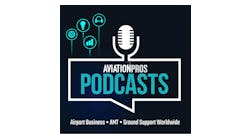Someday very soon, there may be fewer airlines listed on airport arrival and departure screens.
Which names could disappear is the subject of intense industry speculation. But with most of the larger carriers again reporting profits, merger and acquisition talk is gaining momentum.
Delta Air Lines and Northwest Airlines, both operating in bankruptcy, often are seen as the two most likely targets for a suitor. But United Airlines, Continental Airlines and US Airways' names also have come up as possible partners.
Even last week's threats of terrorist attacks haven't dimmed interest in consolidation, although stock prices have fallen since the alerts were issued on Thursday.
In a note to analysts Monday, Calyon Securities analyst Ray Neidl advised that a Continental-United marriage is among those some speculate would make sense. Neidl cautioned that it may be too earlier in the industry's economic recovery to begin mergers, but added that a deal between United and Continental, healthy airlines with largely different market strengths, "would set off a chain reaction in the industry."
The industry is primed to contract, airline analyst Michael Roach said.
"There are too many legacy carriers. ... Everyone agrees there are too many," Roach said. "As a result, it's possible to imagine almost any kind of combination."
That could include combining either Northwest or Delta with a healthier operator. Or some analysts predict that Northwest and Delta could merge, hoping that the resulting carrier would be stronger financially.
Good arguments can be made for those moves and more, but each also brings unique problems, said Joe Brancatelli, editor and publisher of a newsletter for business travelers.
"They all make sense, but I see problems with all combinations," he said. "There's a lot of stuff that goes on when you try to merge cultures and corporations."
In 1980, in the era before airline deregulation, Pan American World Airways and National Airlines merged. The plan was intended to give Pan Am the domestic-route network it lacked, increasing passenger traffic to its international routes. The deal made sense when looking at route maps, but expensive problems quickly emerged.
"The fleets were completely incompatible. The systems were completely incompatible," said airline analyst Robert Mann. "And they had paid a real premium ... to control National. They had paid too much and done it without taking a real pencil to the cost of integration or the real time frame for integration."
The National Airlines name disappeared soon after it was acquired by Pan Am. Pan Am survived about a decade longer, declaring bankruptcy in 1991. In its effort to stave off financial problems in its final years, it sold many of its valuable assets, including Asian routes, to United Airlines.
In addition to routes, fleets and operations, other challenges come when combining airlines. Most of the larger carriers have unionized work forces. Reconciling sometimes vastly different labor deals can take years.
American Airlines bought TWA in 2001, after that carrier sought bankruptcy protection. The agreement saved the jobs of more than 20,000 TWA workers but at a cost. They lost seniority when they were integrated into the American Airlines unions, resulting in many being among the first to be laid off when the industry began suffering financially a few years later.
United Airlines and US Airways terminated pension plans while in bankruptcy. Now, if either attempted to merge with a carrier that still offers a pension, a battle likely would ensue with employees who would want to keep the sometimes lucrative retirement benefit.
"That would not be a trivial issue," said Aaron Gellman, a professor at Northwestern University's Transportation Center. "It's complicated."
As a result, reaping the benefits from a merger "is going to take a couple years, no matter what scenario is proposed," Gellman said.
The most recent large merger took place last year, when America West Airlines combined with the US Airways. The new US Airways faces challenges, including integrating different reservation technologies and resolving labor issues, but the rejuvenated carrier has quickly begun outperforming many of its peers financially.
The merger was made easier because US Airways was on financial life support. It was in the midst of its second bankruptcy in three years, had given up planes, cut pay and benefits and jettisoned its pension plans. Many industry analysts predicted liquidation was likely.
US Airways Chief Executive Douglas Parker said he believes there are financial opportunities by combining with a carrier going through financial reorganization.
"Mergers can create a lot of value," he said. "We clearly demonstrated that putting two companies together can create value."
United Chief Executive Glenn Tilton has called repeatedly for mergers of another type. Tilton wants Congress to reduce restrictions on foreign ownership of U.S. carriers, opening the path for airlines that are international in ownership as well as operation.
During a speech this month at the Chicagoland Chamber of Commerce, Tilton said that "restrictions, including limits on open access to foreign markets and cross-border investment opportunities, prohibit us from taking full advantage of international opportunities and to spread our business risk."
Such combinations have happened. In 2004, Air France took over KLM, the Netherlands national airline. The next year, Lufthansa took over Swiss International Airlines.
Merger talk has gained ground because many analysts believe there are too many carriers vying for travelers' business.
"If one major airline were to disappear, all this talk of mergers would damp down quite a bit," said Northwestern's Gellman.
And a merger wouldn't ensure the surviving carrier's viability, he said.
"Bad management drives out good in mergers," he said. "There are exceptions, but usually the worst managers stay on because their alternatives are less."
Copyright 2005 LexisNexis, a division of Reed Elsevier Inc. All rights reserved.
Terms and Conditions | Privacy Policy
News stories provided by third parties are not edited by "Site Publication" staff. For suggestions and comments, please click the Contact link at the bottom of this page.





